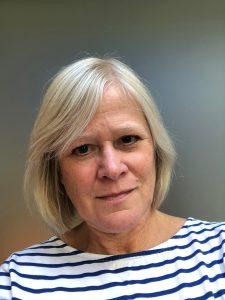 The first interviewee in our series is Julie Cotterell – whose marketing experience spans almost thirty years, working in-house for global pharmaceutical and medical technology companies such as Owen Mumford Pharmaceutical Services, BD, and Smith & Nephew.
The first interviewee in our series is Julie Cotterell – whose marketing experience spans almost thirty years, working in-house for global pharmaceutical and medical technology companies such as Owen Mumford Pharmaceutical Services, BD, and Smith & Nephew.
We’ve had the pleasure of working with Julie for the last five years. As well as being incredibly efficient, her knowledge of the medtech field, specifically drug delivery, made her a great partner for developing valuable content.
Sarah Nurgat: Can you give us a brief tour of your marketing career?
Julie Cotterell: I started out in good old sales straight after graduating. Understanding customers is key for a good marketeer so some sales experience always helps.
Since then, I’ve aways stuck to marketing though I’ve had a wide variety of roles from new product development to managing large portfolios and more latterly digital marketing. I’ve also worked in UK, EU and global roles which is both interesting and helps with understanding different markets, cultures, and people.
Most of my working career has been in large multinationals which of course provide the opportunities for different types of marketing roles and good career progression. However, my most recent role is in a small family-run company which means I have a lot more autonomy to make key decisions on how and where we promote our goods and services.
SN: From your experience in these different environments, what would you say are core skills for marketers?
JC: I love the variety of the job. No two days are the same and there is normally a lot going on at the same time, so your prioritisation and delegation skills need to be good. Also, the ability to work with many people across an organisation helps to really understand how a company works and how each role contributes to making the business a success. Teamwork and collaboration are key.
SN: Now that you have hybrid working after the pandemic, how is this affecting teamwork?
JC: When you have good existing relationships with the people you work with, remote working has its benefits, but for developing new relationships there’s nothing like face to face. I also believe that the best way to learn, especially early on in your career, is to be surrounded by people, engage with them on a daily basis and never be afraid to ask questions.
SN: I agree – it’s why we would never dispense of office days completely. But every business needs to figure out the optimal balance for their own organisation, and that might even change over time.
What other advice would you give to anyone considering marketing as a profession?
JC: If you pick the right organisation to start your career in a junior marketing role, there are many ways to progress and different aspects of marketing to choose from along the way. Certainly, you won’t be bored.
SN: Research tell us that women take an early lead in marketing but are slower to reach senior roles. In one global survey of advertising and marketing professionals, female respondents are dominant in junior positions (64% W vs 36% M) but male respondents are twice as likely to be in C-Suite positions (21% M vs 11% W).
Has this been true in your career?
JC: That may be typical of many types of roles but it’s certainly changing. I can remember years ago being the only woman in a meeting of 20 people. More recently, I attended a multi-disciplinary meeting at a large multinational and everyone round the table was female. Certainly, I deal with many women these days across multiple roles including some of the more stereotypical male positions such as engineering and product design.
SN: It’s interesting to hear how you’re observing this change both in marketing but also the industries you work in.
One last question: can you share the most enjoyable experiences from your career?
JC: Seeing a product from concept to reality is quite special especially when you see all the twists and turns it takes along the way. In more recent years we have more exciting tools to help us promote our products with things like augmented reality and interactive websites that can really bring a product to life, but you still need to know who your target audience is and what information will resonate with them.
SN: Absolutely. From our perspective, we really appreciate the insights we get into the whole development process of medical devices – from human factors testing to sustainable manufacturing. There is a lot happening behind the scenes!
Thanks so much for sharing these experiences with us, Julie.
Want to learn more about careers in marketing? Find our guide on marketing jobs here.



